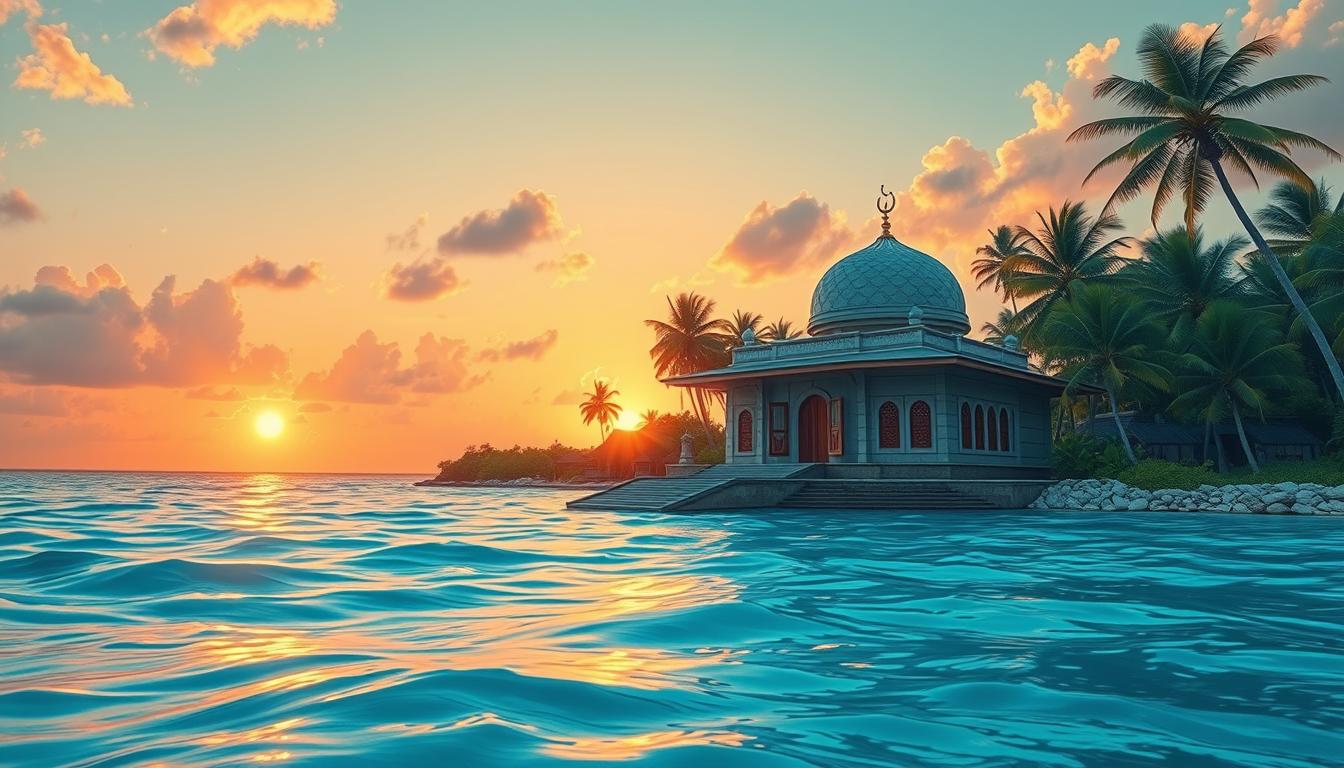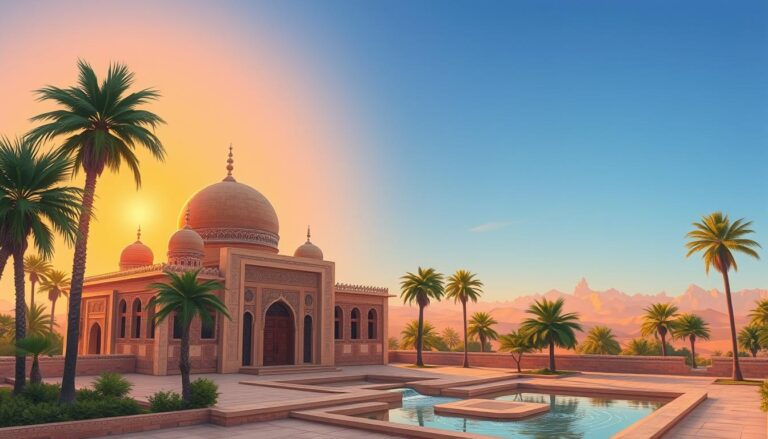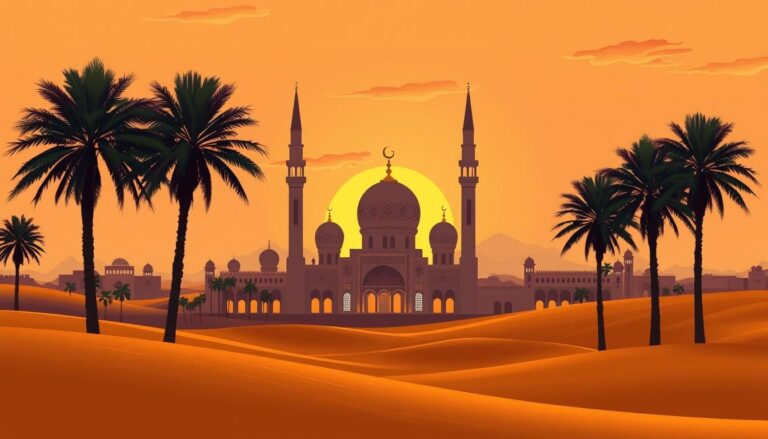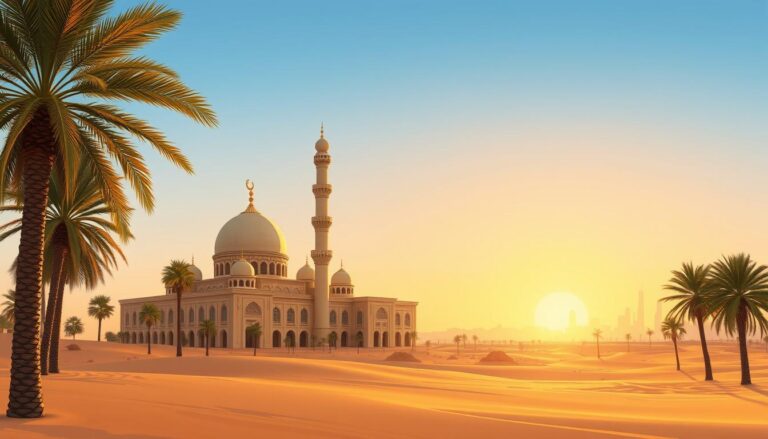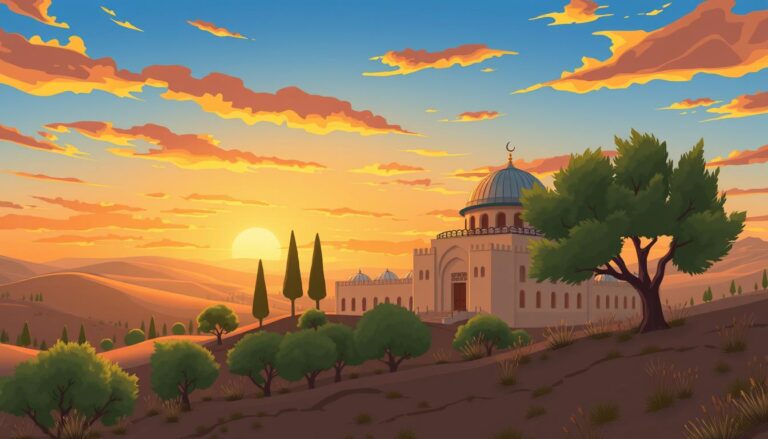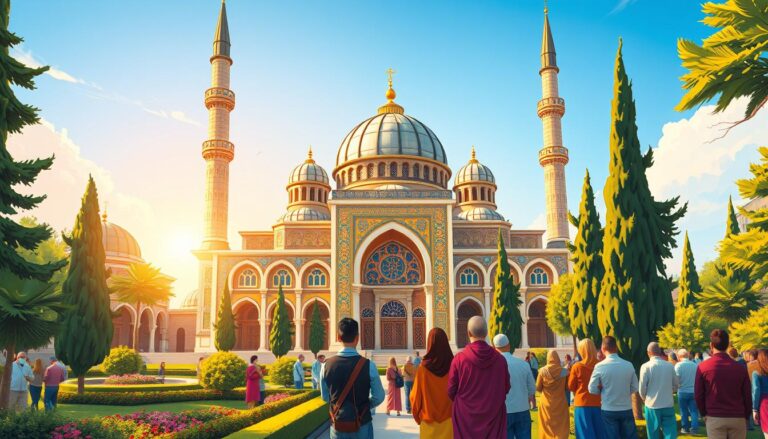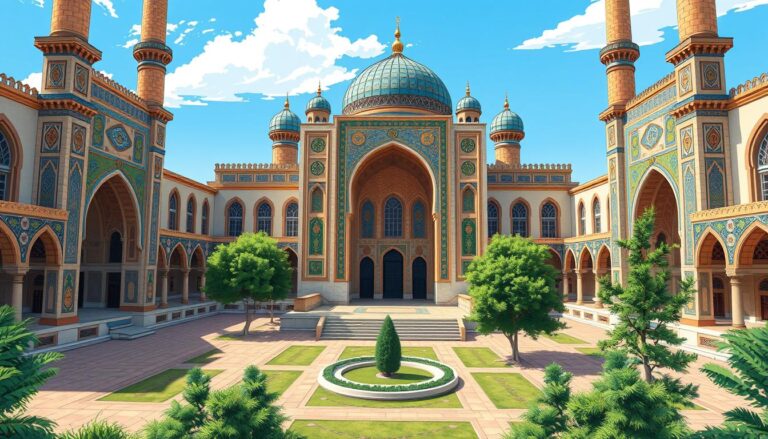Islam in Maldives
Islam is the main religion in Maldives and has shaped the country’s culture for centuries. The 2008 Constitution makes Islam the official state religion. It also says you must follow Islam to be a citizen.
This shows how important Islamic values are in Maldivian life. About 99% of people in Maldives are Sunni Muslims.
The Maldives has a rich Islamic history. Most people, about 98.69%, call themselves Muslim. This makes Islam the main religion in the country.
Other religions like Christianity, Hinduism, and Buddhism are much less common. They make up less than 1% of the population.
Islam: The State Religion of the Maldives
In the Maldives, Islam is a key part of life, being the official state religion. The Maldivian constitution clearly states that Islam is the base for laws and social norms. This shows the country’s strong connection to Sunni Islam.
Constitutional Recognition and Legal Implications
Article 9 of the Maldivian constitution says a non-Muslim can’t be a Maldivian citizen. This rule highlights the legal system’s focus on Sunni Islam. Article 10 also says Islamic Sharia law is the basis for all laws, blending religious principles with the legal system.
Sunni Islam: The Predominant Sect
The Maldives Quran teachings, Maldives Ramadan celebrations, and Maldives Eid festivals show the Maldives’ strong Sunni Islamic practices. These practices have shaped the Maldives for centuries, making its religious landscape unique.
“Sunni Islam is the predominant sect practiced in the Maldives. The country’s adherence to Sunni teachings is reflected in the religious institutions, practices, and celebrations that are deeply rooted in the nation’s cultural fabric. This strong Sunni Islamic identity has been a defining characteristic of the Maldives for centuries, shaping the country’s unique religious landscape.”
The Maldives is known for its commitment to Sunni Islam, thanks to its laws and constitution. This has made the Maldives a key place for Sunni Islam in the region. It affects the country’s social, cultural, and political life.
The Historical Journey of Islam in the Maldives
The introduction of Islam to the Maldives began in the 12th century. The last Buddhist king, Dhovemi, converted to Islam. This started a series of Islamic dynasties that ruled for centuries, until the sultanate became elective in 1932.
Prominent Islamic figures, like Abu al-Barakat Yusuf al-Barbari, played a key role. Their visit in the 12th century helped spread Islam across the Maldives. This process took many centuries.
Before Islam, the Maldives was influenced by Buddhism. Archaeological finds show Buddhist stupas and monasteries from the third century BCE. The 12th-century conversion of the king changed the nation’s culture and identity. It brought in a new era of Islamic rule.
The story of Islam in the Maldives is complex and has different views. Yet, the lasting effect of this change is clear. The Maldives remains a Muslim nation, shaped by its faith for centuries.
Islamic Traditions and Practices in the Maldives
Mosques: Centers of Islamic Worship
Mosques are key in the Maldives, where people gather to worship and pray. Malé has over 30 mosques, built from coral stone and topped with iron or thatch. These mosques are where people go for daily prayers, Friday sermons, and to celebrate important Islamic holidays.
Celebrations and Festivals
The Maldives celebrates several Islamic holidays as national events. Eid al-Fitr marks the end of Ramadan, and Eid al-Adha honors the Hajj pilgrimage. These times bring the community together for religious rituals, gatherings, and to celebrate their Islamic heritage.
“Nearly all Maldivians are Sunni Muslims of the Shafi school, and the state religion of Islam in the Maldives has been maintained since the 12th century.”
The Maldives follows Islamic law, known as Sharia, in its legal system. The government works to keep Islamic values alive, banning other religions for citizens. The mosques, built in the 17th century, show the blend of Buddhist and Islamic architecture in the Maldives.
Islam in Maldives: A Unifying Force
Islam has been key in uniting the Maldives’ diverse people. The state religion, Sunni Islam, has created a strong national identity. It has also brought people together, beyond their differences.
The Maldives is made up of 26 atolls and 1,194 islands. The first settlers came from southern India and Maharashtra. Yet, they found unity in Islam.
Islam arrived in the Maldives in the 6th-5th century BC, when Hinduism was common. Over time, Sunni Islam became the main religion. This has helped create a strong national identity and unity among Maldivians.
“The specific verse 30:2-4 mentions the defeat of the Romans and their subsequent victory, highlighting unique historical missions assigned to different nations. The verse 7:34 emphasizes that every nation has a fixed term, indicating a predetermined destiny for each nation.”
The Quran and the Prophet Muhammad’s words have also played a big role. They show Islam’s message is for everyone. This has helped Maldivians, despite their differences, find common ground in Sunni Islam.
The Role of Islamic Institutions and Authorities
The Maldivian government has set up important institutions to handle religious matters. The Ministry of Islamic Affairs (MIA) looks after Islam-related issues. This includes watching over mosques, training imams, and spreading Islamic teachings.
The Supreme Council for Islamic Affairs gives advice to the government. They help with Sharia law and keeping Islamic traditions alive.
Ministry of Islamic Affairs and Supreme Council for Islamic Affairs
The Ministry of Islamic Affairs (MIA) is the main government body for Islam in the Maldives. They manage mosques, train imams, and promote Islamic values.
The Supreme Council for Islamic Affairs advises the government. They help with Sharia law and keeping Islamic traditions in the Maldives.
These two institutions make sure Islam is at the heart of Maldivian society. They ensure religious affairs follow Islamic law and traditions.
Societal Dynamics and Religious Diversity
Islam is the main religion in the Maldives, but there are also Christians, Buddhists, and Hindus. These groups, along with many tourists, can practice their faiths privately. However, showing or spreading non-Islamic beliefs in public is not allowed.
Non-Muslim Residents and Visitors
The Maldivian government is very dedicated to keeping Islam as the main faith. This is why they don’t let people show or spread other religions openly. This shows their strong commitment to their religious roots, even with people from different backgrounds living there.
Still, the Maldives welcomes over 1.5 million visitors every year. Many of these tourists follow religions other than Islam. They are usually allowed to follow their religious practices quietly while they are there.
“The Maldives stands out as the only South Asian country currently experiencing a severe political crisis related to religious dynamics.”
Keeping Islamic values and accepting different religions is a big challenge for the Maldives. The government and people must find a way to keep their identity while being open to others. This is important for building a society where everyone can respect and understand each other.
Preserving Cultural Heritage and Islamic Identity
The Maldivian government and its people work hard to keep their Islamic culture alive. They take care of old mosques and celebrate Islamic holidays. They also focus on teaching Islamic values in schools.
The Maldives has been Islamic for over 896 years. This change from Buddhism to Islam happened in the 12th century. The country became a republic in 1968, showing its strong Islamic beliefs.
The 2008 Constitution makes Islam the official religion of the Maldives. It outlines how Islamic law guides personal and family life. This shows the deep roots of Sunni Islam in the country.
- The Maldives is often called a “100% Muslim Nation,” showing its strong Muslim population.
- All citizens must be Muslims, with Islam being the basis for citizenship.
- The constitution bans other religions in public, keeping the nation Islamic.
- Non-Muslims can practice their faith privately, respecting personal beliefs while keeping the public Islamic ethos.
Keeping Islamic culture alive is a big goal for the Maldivian government and people. They focus on old mosques, Islamic holidays, and teaching Islamic values. This shows their commitment to preserving their heritage.
“Islam and the Preservation of the Human Heritage” – Abdul Hamid Al-Ansari, Doha Conference of Ulama
The Maldives stands strong as a unified Islamic nation. It preserves its culture and serves as a model of devotion and preservation in the region.
Islam in Maldives: Challenges and Opportunities
The Maldives is known for its beauty and tourism. Yet, it struggles with its relationship with Islam. The country has strict rules on religion, which has sparked criticism. At the same time, it can improve its Islamic institutions and promote understanding among different faiths.
Recently, the Maldives has seen a rise in religious extremism. Between 2014 and 2018, about 250 people joined the Islamic State. This has raised concerns about extremism in the country.
The Maldives also deals with integrating foreign workers, mostly from Bangladesh. These workers, about 20% of the population, work in low-skilled jobs. This can lead to social tensions and challenges to the country’s Islamic identity.
Despite these hurdles, the Maldives can strengthen its Islamic institutions. With 98.4% of the population being Sunni Muslims, it has a solid base for Islamic scholarship. This can help preserve traditional customs and practices.
To overcome its challenges, the Maldives must balance its Islamic values with tolerance and diversity. This balance can help the country address its issues and seize the opportunities in its unique Islamic relationship.
Conclusion
Islam has deeply shaped the Maldives for centuries. The country’s culture, identity, and society have been influenced by Sunni Islam. This is seen in mosques, Islamic festivals, and the role of religious leaders.
The Maldives, with a small population, values its Islamic heritage. Despite a few foreign workers following other religions, Sunni Islam remains central. It is the foundation of the Maldivian identity.
The Maldives faces challenges like high youth unemployment and radicalization threats. Yet, its faith in Sunni Islam unites the people. It guides them and sets the Maldives apart globally.
Source Links
- Religion in the Maldives
- Maldives – United States Department of State
- Maldives – United States Department of State
- Maldives – United States Department of State
- A Short History of the Maldives
- Maldives – And the journey towards an Islamic nation
- RELIGION, FANDITA AND ISLAM IN THE MALDIVES
- No title found
- The Maldives | Muslim Cultures of the Indian Ocean | Research | Institute for the Study of Muslim Civilisations | The Aga Khan University
- History of the Maldives
- Where Islam and Nationalism Collide
- Islam in Maldives
- Islamism and Radicalism in the Maldives
- Maldives crisis: a bitter religious divide comes to the fore
- Maldives in South Asia: Let’s talk about Saudis – Dhivehi Sitee
- When the Maldives Embraced Islam: A Historical Journey
- Is Maldives a Muslim Country? Unveiling Its Rich Islamic Heritage and Cultural Identity
- Cultural Heritage Protection in Islamic Tradition | International Journal of Cultural Property | Cambridge Core
- Maldives: the legacy of Islamic State
- The Maldives: The New Kid on the Islamist Block
- In the Maldives, an ominous rise in intolerant Islam
- Maldives – United States Department of State

